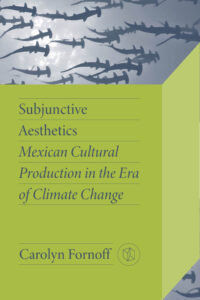By Carolyn Fornoff. Vanderbilt University Press, 2024.
During the twenty-first century, Mexico has escalated extractive concessions at the same time that it has positioned itself as an international leader in the fight against climate change. Cultural production emergent from this contradiction frames this impasse as a crisis of imagination. Subjunctive Aesthetics studies how contemporary writers, filmmakers, and visual artists grapple with the threat that climate change and extractivist policies pose to Mexico’s present and future. It explores how artists rise to the challenge of envisioning alternative forms of territoriality (ways of being in relation to the environment) through strategies ranging from rewriting to counterfactual speculation.
Whereas ecocritical studies have often focused on art’s evidentiary role—its ability to visualize and prove the urgency of environmental damage—author Carolyn Fornoff argues that what unites the artists under consideration is their use of more hypothetical, uncertain representational modes, or “subjunctive aesthetics.” In English, the subjunctive is a grammatical mode that articulates the imagined, desired, and possible. In the Spanish language, it is even more widely used to express doubts, denials, value judgments, and emotions. Each chapter of Subjunctive Aesthetics takes up one of these modalities to examine how Mexican artists, writers, and filmmakers activate approaches to the planet not just as it is, but as it could be or should be.
Carolyn Fornoff is an assistant professor of Latin American studies at Cornell University.
PRASE FOR SUBJUNCTIVE AESTHETICS
“Carolyn Fornoff’s insightful and clearly written Subjunctive Aesthetics draws inspiration from a grammatical mood expressing uncertainty and emotion to offer a new interpretation of twenty-first-century Mexican cultural production addressing ecological catastrophe. An innovative contribution to Latin American Environmental Humanities research, Subjunctive Aesthetics stakes an eloquent claim for the capacity of literature, visual arts, and film to imagine the possibilities of a post-extractivist world.”
—Charlotte Rogers, author of Mourning El Dorado: Literature and Extractivism in the Contemporary American Tropics
“Brilliant and wide-ranging, Subjunctive Aesthetics shows how, instead of merely translated into cultural responses based on a straightforward rendering of factual evidence, the inescapable reality of the current ecological crisis has been reimagined by writers, visual artists, and filmmakers in alternative, hypothetical, and speculative ways. This book is fundamental for anyone interested in contemporary Mexican culture and new directions in the Environmental Humanities.”
—Victoria Saramago, author of Fictional Environments: Mimesis, Deforestation, and Development in Latin America“Subjunctive Aesthetics is an original, innovative, and sweeping study of the narrative strategies deployed in Mexican cultural production of the 21st century in response to the climate crisis. It proposes that the subjunctive mood operates as an artistic expression to contest the definitiveness of foreclosure. In a moment of great despair towards a grim future, Subjunctive Aesthetics opens the possibilities to disrupt such closeness by mobilizing desire, emotion, and the imagination. Through innovative theories that illuminate and deepen our understanding of the climate crisis, Fornoff’s marvelous work allows us to reconsider our place in Earth while it reassures that the seed for transformations nests in potentiality.”
—Gisela Heffes, author of Visualizing Loss in Latin America: Biopolitics, Waste, and the Urban Environment
“This is a fantastic and timely project. The impressive depth of Fornoff’s contextual research is well matched by the nuance in her analyses.”
—Brian Gollnick, author of Reinventing the Lacandón: Subaltern Representations in the Rain Forest of Chiapas
